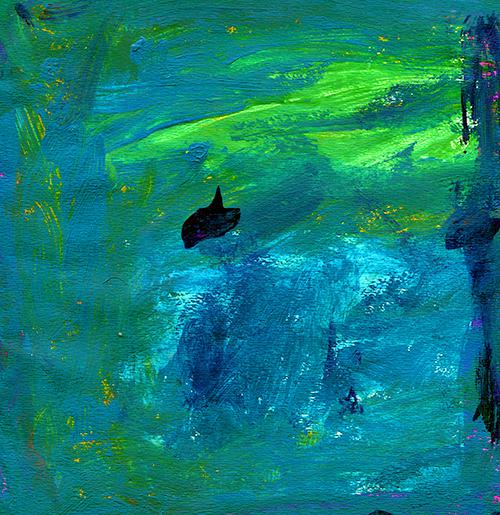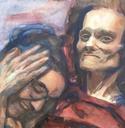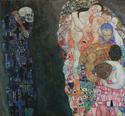People with disabilities have taught me so much over these past forty-two years as we have lived and shared together in L’Arche as friends and companions, as brothers and sisters, as people brought together by God. In fact, they have not only taught me; they have transformed me and brought me into a new and deeper vision of humanity. They are helping me discover who I am, what my deepest needs are, and what it means to be human. They have led me into a new and meaningful way of life quite different from what society advocates. They have revealed to me the need for community in our societies and that those who are weak and vulnerable have something important to bring to our world today.
Before L’Arche, I was searching—not quite knowing what I was searching for. I had developed my capacities as a naval officer and had learned to be disciplined and efficient. I also studied and taught philosophy. Like everyone else, I wanted to do well and be appreciated by my superiors. My belief in Jesus and my desire to know and live the gospel message were important to me, but I had not yet found my “earth,” my anchor, my resting place. I am profoundly grateful to people with learning disabilities because with them I have found this “earth”: I have a found a unity between my life and my faith, between what is interior and exterior, between what I think, feel, and understand and what I do.
This may give the impression that the founding of L’Arche was simply a process of self-searching and only for self-fulfillment. This is, of course, partly true. However, I fundamentally believe that L’Arche began as a response to a cry that I first heard when I visited an institution for thirty men with learning disabilities where Fr. Thomas Philippe, a friend, was chaplain. This cry, “Do you love me? Am I important? Will you be my friend?” was expressed or written on the faces of those men and of many others in different institutions and of those living in painful situations. I wanted to create a place where they could find inner freedom, develop their personhood and abilities, and be fulfilled, where they could let their deepest desires rise up and find a new meaning for their lives.
Each person, whatever his or her abilities or disabilities, needs to be nurtured in love. ... When this need is not fulfilled, a deep wound is implanted in the heart.
Many of those who came to L’Arche were in deep need. They carried within their hearts the wounds of rejection. They suffered from a lack of self-esteem and from major physical and psychological difficulties. Some were prone to violence or had self-destructive attitudes and a fear of growth. It was clear to me that in order to be a place of growth, healing, and inner liberation, L’Arche needed the help of good professionals. Thanks to many psychiatrists and other professionals, I am learning an inner wisdom of bringing together the resources of human sciences (psychology), ethics, spirituality, and religion. I am learning the necessity of creating a milieu of life where people can find inner healing and which has clear structures integrated into the social, political, and health systems in a country. I am learning about the need for prayer and spirituality, not only for people with learning difficulties but for everybody. I am discovering more fully the place of church and of a religious affiliation. I am discovering a lot about the human person and the purpose of education: to bring people not just to greater autonomy and independence but also to greater maturity. Let me point out just a few things I have seen and experienced during these forty-two years.
1. Each person, whatever his or her abilities or disabilities, needs to be nurtured in love. The desire to be loved as a person, as someone unique, is at the source of the person’s development and at the source of all self-esteem. When this need is not fulfilled, a deep wound is implanted in the heart. Many people with disabilities have been regarded by their parents as a disappointment and a source of shame. This profoundly wounds children. In order to grow to greater fulfillment, these children need a place of belonging where they feel loved and respected.
2. The fear in couples of giving birth to a child with a disability is imprinted in the culture of every society. They are often seen as “subhuman,” and they are rejected—or put aside in some way. Many are aborted if the existence of an abnormality is detected in the mother’s womb. Many are put away in large institutions. Throughout the world, hundreds and hundreds of institutions exist where people with learning disabilities live in inhuman conditions.
3. The values many modern societies hold are independence, individualism, and success for every citizen. More traditional societies are respectful of the old and the sick, but even they are often unable to see people with learning disabilities as important. In richer societies, the weak are seen as an economic and human liability. And so, people with learning disabilities are pushed to the margins of society.
4. Many people with learning disabilities need help from professionals in order to overcome physical and psychological difficulties, to grow to greater autonomy, and to develop their capacities in various fields. But, above all, they are yearning for meaningful, authentic, respectful, and committed relationships. Their cry for love flows also from their deep loneliness and their lack of self-esteem. They have called me to listen and to respond to their cry with competence, to welcome their vulnerability with tenderness, and then to be in communion with them. As we respond to this fundamental cry for friendship, they begin to transform and to heal us. We can either hide our vulnerability behind a strong, protective ego, or else we can discover that our vulnerability is a source of communion and unity. We do not need to control or have power over them. We can be in communion with one another, offering to each other our mutual need for one another. In this way they have awoken in me what is deepest and most precious: a desire to give life to others and to receive life from them through a communion of hearts.
In 1978 we welcomed Eric into one of our homes here in Trosly. He was sixteen and had spent twelve of those sixteen years in the children’s ward of a psychiatric hospital. Eric had severe learning disabilities, but was also blind and deaf and unable to walk by himself. I don’t think I have ever seen a young person filled with so much anguish. He just wanted to die. What meaning could life have for him? Our aim in L’Arche is to transform the broken self-image of someone like Eric into a positive self-image, the wish to die into a desire to live. When I left the leadership of the community, I spent a year in Eric’s home for ten people with severe disabilities. His utter littleness and poverty, the moments of gentle trust, awoke in me a deep feeling of compassion. In the morning when we would bathe him in the warm water, his whole body would relax and manifest that he was happy. As the months went by, he became more and more peaceful. Eric taught me so much about being attentive to wounded, vulnerable persons: how to interpret their body language and live a communion of hearts with them.
People like Eric have led me into the need for community and for a simple lifestyle where the essential is to care for one another, to celebrate life, to be open, and to grow more loving and understanding toward neighbors and friends, a lifestyle where we are no longer each for ourselves alone, but together we are a sign of a new way of life, where the weak and the vulnerable and the marginalized have their place.
John Paul II said something to this effect in a document he wrote in 2004 for a symposium on the “Dignity and Rights of Disabled People”:
It is said, justifiably so, that disabled people are humanity’s privileged witnesses. They can teach everyone about the love that saves us; they can become heralds of a new world, no longer dominated by force, violence and aggression, but by love, solidarity and acceptance, a new world transfigured by the light of Christ, the Son of God who became incarnate, who was crucified and rose for us.
Since people with learning disabilities are limited in their capacity to rationalize and form ideas, and their verbal language is limited, they tend to communicate more through their bodily gestures and simple words of love, or of anger. Through them I have discovered the importance of work and interesting activities for their personal development, but their desire to celebrate life and have fun are even more important because they are a sign of mutual belonging. In this way they call us all to celebrations that bring people together with all that is beautiful: food, wine, song, dance, laughter, dress, decoration. It is a time when all can rejoice—with their abilities and disabilities—and give thanks to God for having moved us all from loneliness to togetherness. The child within my own self has learned to laugh and celebrate and give thanks for all that bonds us together. People with disabilities have called forth the child in me. They have taught us all in L’Arche how to rest in love and mutual caring, how to celebrate life and also celebrate death, to speak about death, to accompany people who are dying. Death is a part of life: it is not something to be terrified about, but rather is the final passage into a new life.
As those who are weak and vulnerable have called forth in me the wisdom of love, they have also made me more vulnerable. I have been brought closer not only to what is most beautiful in me, but also to the world of darkness, fear, and anguish within my own heart, to all my own difficulties in relationships, and to my need to prove myself. Faced with their anguish, I have seen violence rise up in me. But since I live in community and have the support of my brothers and sisters in the community, this violence is contained. It is only when we touch the powers of destruction within us and begin to accept that they are there, but do not let ourselves be controlled or governed by them, that we can truly understand and accept others in their anguish—and then help them to grow.
Martin Luther King said that people cannot stop despising others—as well as other groups of people—unless they begin to accept what is despicable in themselves. What is it that we all despise in ourselves? Isn’t it our radical poverty, our utter helplessness in many situations, our need of others, our mortality, and our capacity to hurt others? We did not ask to be born. We do not know when or how we will die. We do not possess life. We receive it. I have discovered that this helplessness makes me turn more to God and to my brothers and sisters in community. I cannot say that I have accepted all that is despicable in me, but I am more aware of my need for transformation.
I can also say that living with those who have known rejection and have been despised has opened up my heart to the pain of all those throughout the world who are “different,” who have experienced rejection and hatred because of a disability or not. They, too, need love so that they no longer live closed up in fear but open up in trust. I have come to the realization that peace cannot come to our societies and our world unless those who are rich and powerful accept loss and a certain helplessness in order to enter into authentic relationships with those who are weak, vulnerable, and powerless, and unless the latter rise up from their depression, aggression, and anger and find trust in themselves and in others. This can only come about if we rediscover new ways for the weak and the strong, the rich and the poor, to meet each other and to discover their common humanity.
In this way, the cry of the weak and the vulnerable can bring together people of different religious traditions. They can become a source of unity. After participating in an interreligious pilgrimage with people with learning disabilities in Bangladesh, the Taizé Brothers wrote the following:
We discover more and more that those who are rejected by society because of their weakness and their apparent uselessness are in fact a presence of God. If we welcome them, they lead us progressively out of a world of competition and the need to do great things, towards a world of communion of hearts, a life that is simple and joyful, where we do small things with love. The challenge today in our country urges us on to show that the service of our weak and vulnerable brothers and sisters means opening a way of peace and unity: welcoming each other in the rich diversity of religions and cultures, serving the poor together, preparing a future of peace.
People with learning disabilities are leading me more fully into an understanding of the gospel message and of the life of Jesus. Jesus’ life and message are for all, but in a special way for those who have been cast aside. To enter into the kingdom of God we need to become like little children. Saint Paul tells us that God has chosen the weak and foolish in the eyes of the world and that they are necessary—indeed, indispensable—for the church, which is the body of Christ. So many of us intellectualize this message of Jesus and remain inside our own heads. People with disabilities have helped me to realize that it is a message of the heart, a message of love and of humility adapted to those who cry out, “Do you love me?” and who are open to a personal relationship with God. This cry for relationship from people who are weak and vulnerable has helped me to live closer to Jesus, the Word who became flesh, vulnerable and little, the one who begs each one of us to receive him into our hearts so that we may receive others into our hearts.



